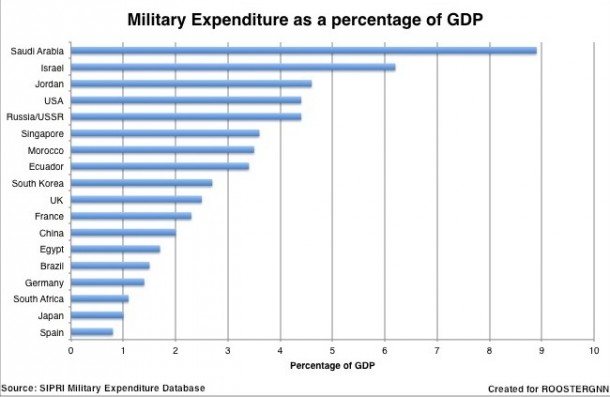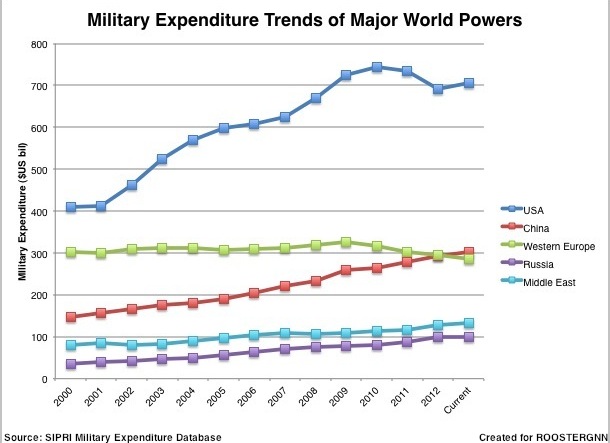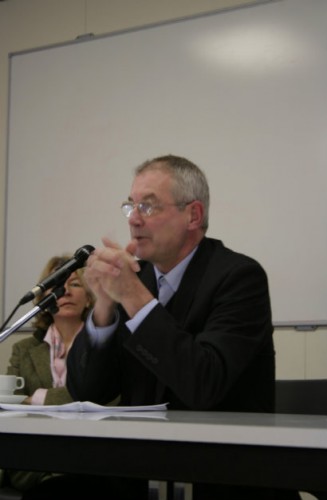WARSAW, POLAND. The 13th World Summit of Nobel Peace Laureates, which ROOSTERGNN has been covering live here, included a series of Civic Academy workshops throughout which participants could explore important global issues in more depth.
Along with Colin Archer, Secretary-General of the International Peace Bureau, Fr. Paul Lansu, Senior Policy Advisor for Advocacy on Security and Human Rights at Pax Christi, led one of these workshops, titled “Move the Money! Disarmament for Sustainable Development in the 21st Century.”
Since 1990, Fr. Paul Lansu has been a staff member at the International Secretariat of Pax Christi in Brussels, Belgium. Specifically, he takes care of the programmes dealing with security and disarmament, human rights, peace building, and other local religious matters. He has also organised and participated in various fact finding missions all around the world (see the full list in his biography at the end of this interview).
At this particular workshop, Fr. Paul Lansu pressed for an end to the over-funding of military establishments and for the creation of new funds to tackle poverty, human insecurity and other common threats to the planet. He also spoke about peace building and reconciliation and has kindly given ROOSTERGNN access to the full paper he presented at the workshop, titled “The European Union as a Peace Building Entity.”
This gave rise to a series of follow-up questions, the result of which is the following interview.
Could you provide some data on what amounts of money are currently being spent on military establishments by different governments around the world? How does this differ from country to country? And how is this spending to be put into relation to spending on other causes?
Fr. Paul Lansu: The annual total of global military expenditure has now risen to over 1.700 billion dollars. We have those figures from SIPRI in Sweden.
We campaign mainly on the reduction of military expenditure and we are convinced that – given political will – by reducing funding for the military sector, significant amounts of money could be made available for social and environmental projects, domestically or abroad. This is an argument that has special relevance to the debate on the UN’s Post-2015 Development Agenda.
The financial costs of nuclear weapons and their delivery systems and the human consequences of this diversion of limited national treasure can be mentioned especially. Schools across our planet are being shuttered; hospitals closed, and people being forced out or lacking subsidized housing in part as a consequence of these preparations for nuclear apocalypse. These are real people’s lives, and some of these people are also in motion politically. The costs of military expenditure and the need to Move the Money will help to broaden this understanding and contribute to broadening that thinking.
Where, in your opinion, should this money really be spent?
We are encouraged to see a growing international recognition of the need for a stable, peaceful society as a pre-requisite for true sustainable development. For example, a recent UN post-Millennium Development Goals (MDGs) report focusses on what it refers to as “Five Transformative Shifts”: an end to extreme poverty, sustainable development, job-centred and inclusive economic growth, peace-building and accountable institutions, and developing a “global partnership” among states. The report repeatedly highlights the many negative consequences of conflict and the toll they take on development initiatives.
What can young people, or in fact any person, do to help reduce the budget spent on military expenses?
Peace education is essential in creating a public opinion that is critical on military expenditures and its consequences for the social and human dimension of our society. The “common good” and the “human dignity of each person” should be at the heart of our concern. Civil society should be better informed and decision makers should listen to the needs especially of poor people, unemployed, young people and women. Politicians should be more courageous in making those decisions that lowers the military expenditures.
And what can we do, in turn, to increase the creation of new funds to tackle poverty, human insecurity and other common threats to the planet?
The “disarmament for development” issue is a global problem and should be solved in that context. International institutions such as the United Nations, World Bank, IMF and others, have to focus on this important challenge. They should convince all governments making decisions to solve violent conflict via talks and negotiations instead of making use of more and more arms and high tech weaponry such as drones or killer robots. The military industry should be more transparent and under the direct responsibility of political authorities. So no support for those private companies who make a lot of profit by producing better and more expensive weapons. No to private armies, rebel and paramilitary groups. Intergovernmental bodies such as NATO should be reformed and should become rather an instrument of peace building instead of preparing for war.
Many of the discussions at the World Summit of Nobel Peace Laureates were marked by the conflict in Syria, as well as the one in Israel and Palestine. In your opinion, what actions should be taken in the case of Syria?
It is urgently necessary to focus on the following steps to be taken for Syria:
- Start an immediate cease fire.
- End all weapon deliveries to the parties involved in the civil war (as requested by Ban Ki-moon in September last).
- Start talks and negotiations (Geneva 2) end of November 2013 – all parties involved should be represented. Come to a negotiated solution, a kind of a “Pax Syria” (compared with Pax Dayton for BiH).
- An agreement should include the option of free elections in Syria.
- Right of return of all refugees and displaced.
- Start a process of truth collection and also setting up a Truth Commission which can lead to reconciliation.
The other is the role of the media on the war in Syria. Media should be objective. The truth is important.
And in the case of Israel and Palestine?
I can write a book on this. The main problem is the occupation over the Palestinian territories by Israel. There should be an end of the occupation as soon as possible. The other main problems are: the status of Jerusalem; the settlements; the economic dependence of the Palestinians; Palestinians forced to live in open prisons, such as Gaza, due to the wall and the check points. A solution should be found on the right of return of Palestinian refugees since 1948 or they should be compensated. Israel has the right to exist and they have the right, even the duty, to protect their civilians.
What has your organization done to help in terms of peace campaigning in these areas, and in general?
Pax Christi International has the violent conflicts high on its agenda: Iraq, Syria, DRCongo, Israel/Palestine, etc. We are an international network of about 117 national organisations and we do a lot on advocacy and campaigning on those issues including on disarmament, development, human rights, peace education, active nonviolence and more. Pax Christi International has a Special Consultative Status with ECOSOC and makes regularly interventions at the United Nations and other intergovernmental institutions such as the Council of Europe. We work together with several other international peace coalitions such as the International Peace Bureau but also with the World Council of Churches and the Holy See.
With regards to aid, it is often said that “giving money is not enough.” What is your take on this? How can true sustainable development be achieved?
Caritas or giving aid for those in need is a must and is a human duty. That needs to be done always. But Caritas is not enough. Decision makers should break the spiral of violence. That spiral starts with structural violence and injustices that is followed by violent protest against that and result in more violence against those who resist. For instance, the occupation of Israel over Palestine is a structural problem/violence and is followed by different Intifadas from the Palestinians, which result in new reactions from the Israeli against the Palestinians. True sustainable development is a long process, basically with ups and downs. Sustainable development should be our main international political concern. Several violent conflicts and terrorism start from the lack of development such as poverty.
***
Paul Jozef Lansu was born on 14 March 1951. He is currently a Roman Catholic Priest of the Diocese of Antwerp, Belgium. He has a Masters Degree of Arts in Peace Studies from the University of Bradford, United Kingdom.
Since 1979, Fr. Lansu has had Special Consultative Status with ECOSOC. From 1982 to 1989, he served as a Political Secretary for Pax Christi Flanders in Belgium and currently, has represented the International Secretariat on many occasions at different national assemblies of Pax Christi sections and international meetings of partners.
He has been on fact finding missions to the Middle East, Former Yugoslavia, Philippines, Indonesia, Sri Lanka, India, Australia, New Zealand, Brazil, Colombia, Central America, Haiti, Jamaica, Northern Ireland, South Africa, Egypt and Ethiopia. He coordinates the different representations of Pax Christi International at the international level, notably with the United Nations. He has written several papers and articles on topics related to the work of Pax Christi International, which have been published worldwide.
In 2007, Fr. Paul became a member of the Core Group of the World Council of Churches for the Palestine Israel Ecumenical Forum (PIEF). In 2006, Paul has been elected member of the Board of the International Peace Bureau, IPB, and Vice President of IPB in 2013 – 2016.


